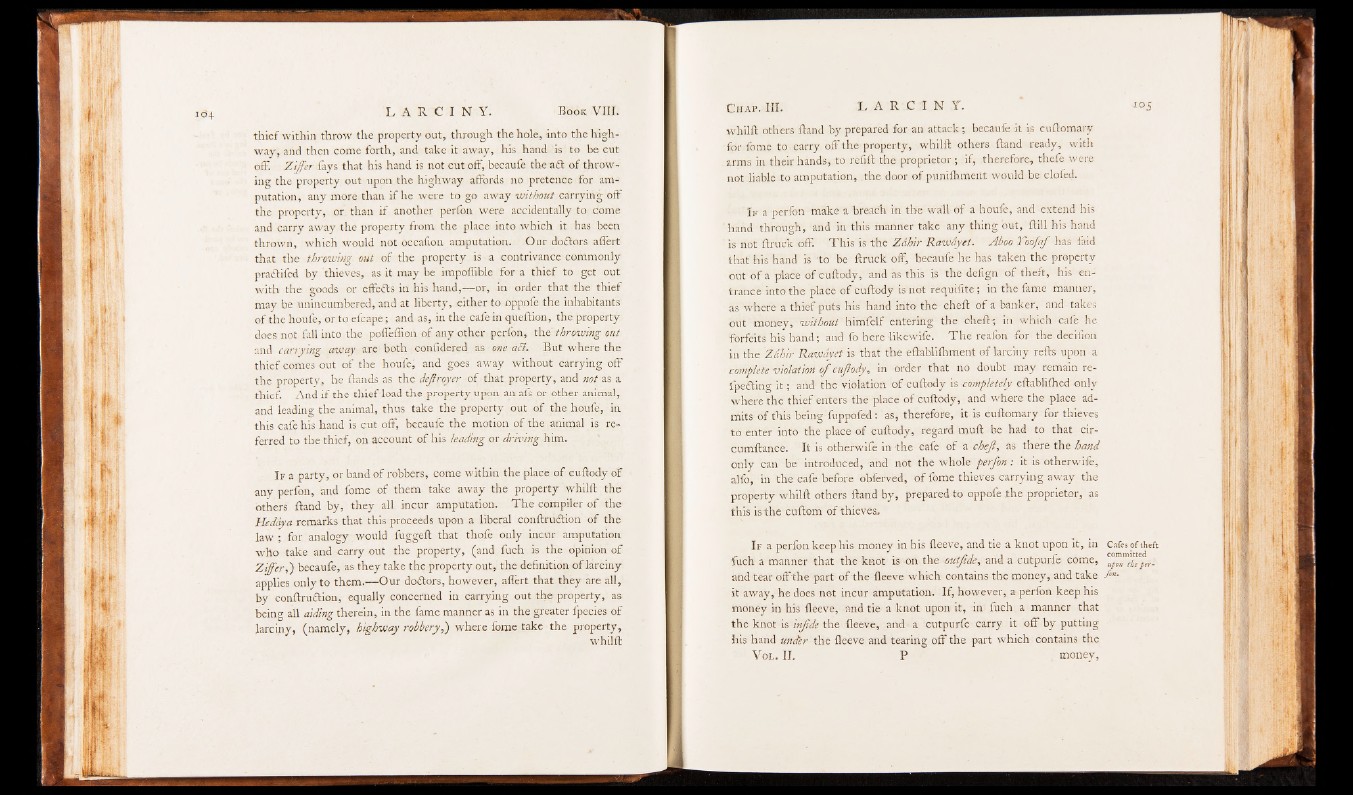
V
thief within throw the property out, through the hole, into the highway,
and then come forth, and take it away, his hand is to be cut
off. Ziffer fays that his hand is not cut off, becaufe the adt of throwing
the property out upon the highway affords no pretence for amputation,
any more than if he were to go away without carrying off
the property, or than if another perfon were accidentally to come
and carry away the property from the place into which it has been
thrown, which would not occafion amputation. Our doctors aflert
that the throwing out of the property is a contrivance commonly
pradtifed by thieves, as it may be impoflible for a thief to get out
with the goods or effedts in his hand,— or, in order, that the thief
may be unincumbered, and at liberty, either to oppofe the inhabitants
of the houfe, or to efcape; and as, in the cafe in queftion, the property
does not fall into the poffeffion of any other perfon, the' throwing out
and carrying away are both confidered as one aB. But where the
thief comes out of the houfe; and goes, away without carrying off
the property, he Hands as the dejtroyer of that property, and not as a
thief. And if the thief load the property upon an afs or other animal,
and leading the animal, thus take the property out of the houfe, in
this cafe his hand is cut off, becaufe the motion of the , animal is:; referred
to the thief, on account of his leading or driving him.
If a party, or band of robbers, come within the place of cuftody of
any perfon, and fome of them take away the property whilft the
others Hand by, they all incur amputation. The compiler of the
Hedaya remarks that this proceeds upon a liberal conftru&ion of the
law ; for analogy would fuggeft that thofe only incur amputation
who take and carry out the property, (and fuch is the opinion of
Ziffer,') becaufe, as they take the property out, the definition of larciny
applies only to them.— Our doctors, however, aflert that they are all,
by conftrudtion, equally concerned in carrying out the property, as
being all aiding therein, in the fame manner as in the greater fpecies of
larciny, (namely, highway robbery,) where fome take the property,
whilft
whilft others Hand by prepared for an attack; becaufe it is cuftomary
for fome to carry off the property, whilft others ftand ready, with
arms in their hands,, to refill the proprietor .; if, therefore, thefe were
not liable to amputation, the door of punilhmeiit would be clofed.
If a perfon make a breach in the wall of a houfe, and extend his
hand through, and in this manner take any thing but, ftill his hand
is not ftruck off. This is the Zdhir Rawdyet. Aboo ? oofaf has faid
that his hand is to be ftruck off, becaufe he has taken the property
out of a place of cuftody, and as this is the defign of theft, his entrance
into the place of Cuftody is not requifite; in the lame manner,
as where a thief puts his hand into the cheft of a banker, and takes
out money, without himfelf entering the cheft-, in which cafe he
'forfeit’s’'his hand; aind fo herelikewi-fe. T h e reafon for the decifion
in the Zdhir Rawdyet is that the eftablilhment of larciny refts upon a
complete violation o f cuftody, in order that no doubt may remain re-
fpedtin°- i t ; and the violation of cuftody is completely eftablifhed only
where the thief enters the place of cuftody, and where the place admits
of this being fuppofed: as, therefore, it is euftomary for thieves
to enter into the place of cuftody, regard muft be had to that cir-
cumftance. It is otherwife in the cafe of a cheftr, as there the hand
only can be introduced, and not the whole perfon: it is otherwife,
alfo, in the cafe before obferved, of fome thieves carrying away the
property whilft others ftand by, prepared to oppofe the proprietor, as
this is the cuftom of thieves.
If a perfon keep his money in his fleeve, and tie a knot upon It, in Cates of theft
fuch a manner that the knot is on the outftde, and a cutpurfe come,
and tear offthe part of the fleeve which contains the money, and take fm-
it away, he does not incur amputation. If, however, a perfon keep his
money in his fleeve, and tie a knot upon it, in fuch a manner that
the knot is inftde the fleeve, and a cutpurfe carry it off by putting
his hand under the fleeve and tearing off the part which contains the
V ol. II. P money,